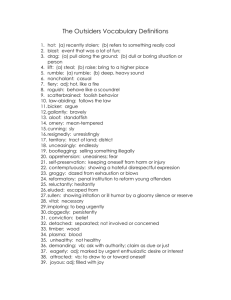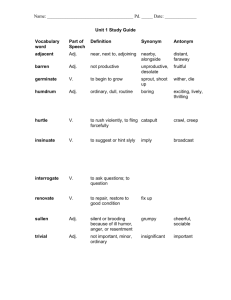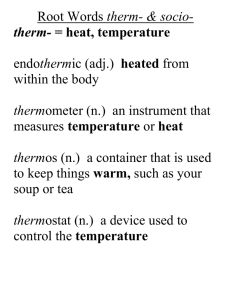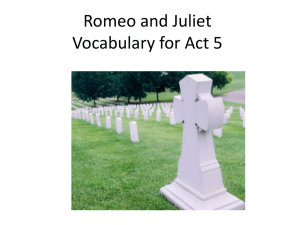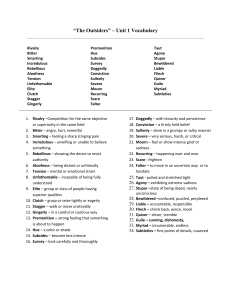Root Word: - Newton.k12.ma.us
advertisement
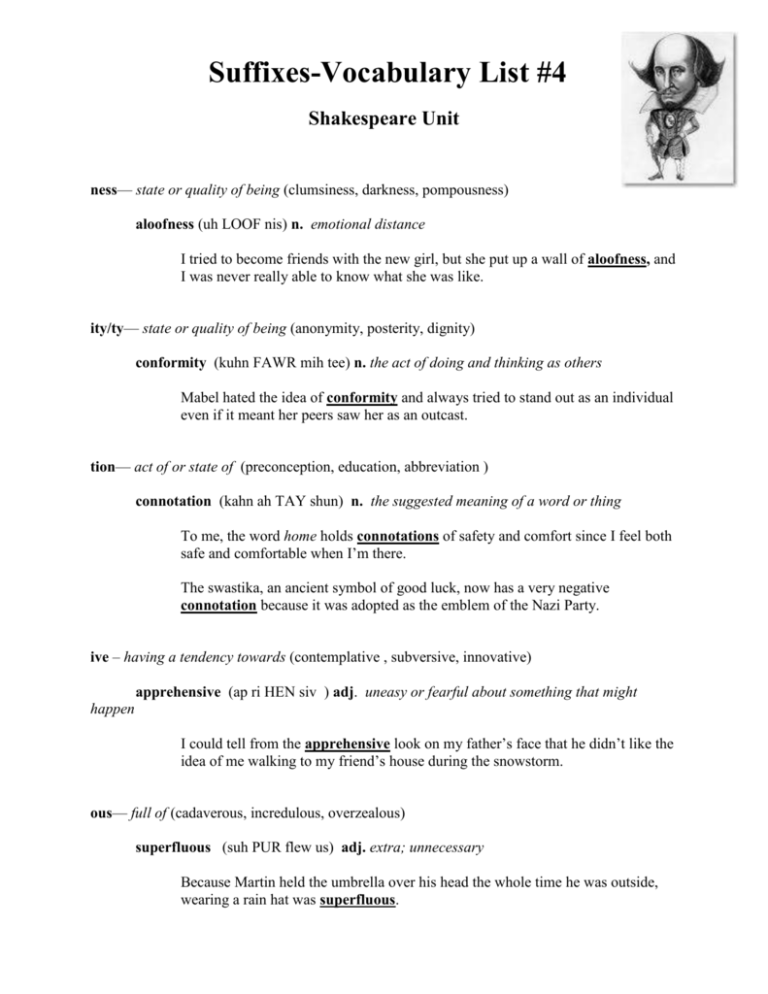
Suffixes-Vocabulary List #4 Shakespeare Unit ness— state or quality of being (clumsiness, darkness, pompousness) aloofness (uh LOOF nis) n. emotional distance I tried to become friends with the new girl, but she put up a wall of aloofness, and I was never really able to know what she was like. ity/ty— state or quality of being (anonymity, posterity, dignity) conformity (kuhn FAWR mih tee) n. the act of doing and thinking as others Mabel hated the idea of conformity and always tried to stand out as an individual even if it meant her peers saw her as an outcast. tion— act of or state of (preconception, education, abbreviation ) connotation (kahn ah TAY shun) n. the suggested meaning of a word or thing To me, the word home holds connotations of safety and comfort since I feel both safe and comfortable when I’m there. The swastika, an ancient symbol of good luck, now has a very negative connotation because it was adopted as the emblem of the Nazi Party. ive – having a tendency towards (contemplative , subversive, innovative) apprehensive (ap ri HEN siv ) adj. uneasy or fearful about something that might happen I could tell from the apprehensive look on my father’s face that he didn’t like the idea of me walking to my friend’s house during the snowstorm. ous— full of (cadaverous, incredulous, overzealous) superfluous (suh PUR flew us) adj. extra; unnecessary Because Martin held the umbrella over his head the whole time he was outside, wearing a rain hat was superfluous. able/ible— capable of (irrevocable, incontrovertible, tangible ) unfathomable (un FATH um uhbul) adj. difficult or impossible to understand The kindergartners stared at their teacher with blank expressions on their faces, signaling that her lecture on global warming was unfathomable to them. ize/ise— to make (scrutinize, categorize, advise) epitomize (ee PIT uh mize) v. to serve as the typical or ideal example of something The pyramids of Egypt epitomize the tremendous engineering skills those ancient people possessed. Shakespeare’s “Sonnet 18” epitomizes how deep feelings can be expressed through language. ate— to cause or make (substantiate, resonate, perpetrate) insinuate (in SIN yoo eyt) v. to suggest or hint slyly When you read Shakespeare, you really must read between the lines in order to ascertain the hidden meaning that his words insinuate. The teacher stared at only me when she yelled at the class for disrespecting the substitute teacher, which I’m sure was her way of insinuating that I caused all the trouble. fy/ify—to make or intensify (beautify, unify, horrify) vilify (VIL ih fie) v. to speak ill of; slander Both generals vilified their opponents as unpatriotic traitors. Carl was wrong to vilify Sandra in front of the class; she wasn't the one who cheated on the quiz. ly— like (intermittently, conspicuously, incoherently) contemptuously (kahn TEMP chu es lee) adv. in a disrespectful manner Alice always treated her brother contemptuously because she felt he was a nothing but a pest.
